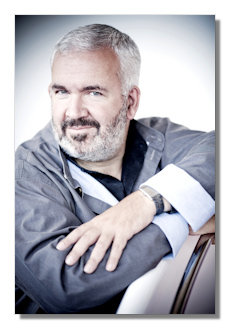
The Internet's Premier Classical Music Source
Related Links
- Latest Reviews
- More Reviews
-
By Composer
-
Collections
DVD & Blu-ray
Books
Concert Reviews
Articles/Interviews
Software
Audio
Search Amazon
Recommended Links
Site News
 Concert Review
Concert Review
Knockin' on Heaven's Door

Franz Schubert
- Symphony #1
- Symphony #9
Les Musiciens du Louvre Grenoble/Marc Minkowski
Brussels, Centre for Fine Arts, 11 September 2012
Marc Minkowski and his Musiciens du Louvre Grenoble have embarked on an ambitious Schubert symphonies cycle (available as 4CD set on Naïve V5299). As most period-performance specialists Minkowski gradually ventured from the Baroque into the Classical, and now the early-Romantic era. Earlier this year he recorded with his ensemble the eight symphonies in Vienna for CD release and currently tours different concert venues across Europe. In Brussels I caught a performance of the First and Ninth Symphonies, as part of the Flemish radio music festival (Klarafestival) which offered the full cycle spread over three different cities.
The music is obviously approached with the necessary baggage of scholarly research, although Minkowski and his talented band seem to keep a rather laidback attitude and their quest for historic accuracy doesn't exclude a fair amount of pragmatism and above all congeniality. Yet while their Schubert in these symphonies brimmed with vivacity and joy, there were some issues that prevented this concert from being a total winner.
The color and transparency of the period instruments were a constant delight, the balance generally well-judged. The strings - warm and even allowed some vibrato - may ideally have been too numerous in the First Symphony even for a large hall, with the Ninth everything fell into place. Interestingly, Minkowski only slightly altered the orchestral setup between the two. He kept the same number of strings, but added for the Ninth (besides the famous three trombones of course) a third player to each of the woodwinds and two more horns. Violins were divided, while four double basses were positioned in the center at the back of the ensemble where normally the timpani are. Timpani were behind the cello's to the right, followed by the two trumpets and three trombones. It wasn't perhaps exactly what Schubert had in mind, but it sounded "right" for most of the time.
What didn't always sound right, however, was Minkowski's conducting. His tempo choices were unconvincing in the First. Schubert was barely 16 when he composed his first symphony. It's an ambitious opus which through the obvious nods towards Haydn and the likes already reveals plenty of character. Minkowski started well enough with a lively account of the first movement, although by attacking the opening Adagio briskly and without any solemnity he overlooked the ambiguity of this passage. No exposition repeat was observed either. And from then on things started to fall apart. The Andante was taken very slow and dragged without much consequence in spite of some fine support from the woodwinds. A similar lack of fantasy also scuttled the menuet which began as a clumsy heavy-footed slow instead of the required Allegro. The contrast with an equally sagging trio went as a result totally adrift. Minkowski sort of picked things up by driving the closing Allegro vivace home at breakneck speed. Punchy and fun, no doubt, yet related to what came before this could hardly be called inspired conducting.
Tempi were generally more agreeable in the Ninth, although the opening sounded over-cautious and was blown to shreds by intrusive horns. But once there Minkowski ensured a solid, energetic drive to the vast movements of "the Great". He knows how to build up tension and his musicians follow as one, although Minkowski's loose, nonchalant approach turned quickly counterproductive in a work of this scale. The first movement's exposition was repeated this time, only to perform it differently the second time around. And was it really necessary to draw out the trombones' theme in such a cheap manner during the repeat? The Andante was well-paced and highlighted the excellent woodwinds again. He skipped the second repeat in the third movement and also in the Finale. It all breathed an air of improvisation, but also a refusal to dig really deep into the music, and of rustic rather than refined joy. In the end, Minkowski offered the famous heavenly length of Schubert on a human scale but while the festival boasted the promising slogan of "Knockin' on Heaven's Door", we were at least for this concert mostly left standing at that door.
Copyright © 2012, Marc Haegeman












